Dive into a fascinating exploration of 'carousing' in biblical context, unearthing its historical significance and potential relevance in our modern world.
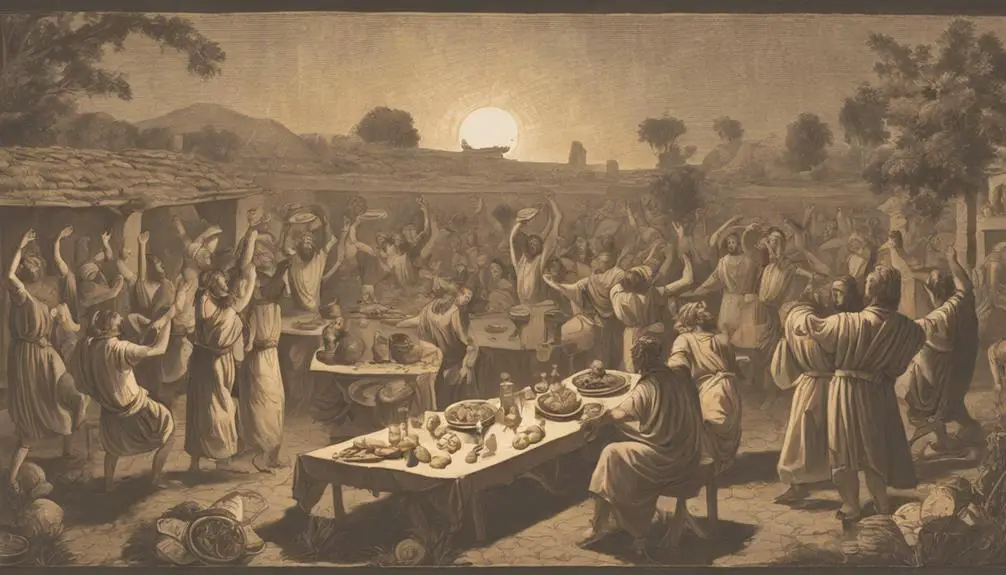
Definition of Carousing in the Bible
While you might confuse carousing with carousel rides at the county fair, in biblical terms it's quite a different event. Carousing, as referenced in the Bible, often denotes indulgence in excessive eating and drinking, usually tied to immoral behaviors.
But what does it really mean in the context of biblical teachings? How did cultural and historical influences shape its understanding? Let's peel back the layers of ancient texts and explore the true essence of this term, and perhaps, find its relevance to our contemporary society.
Shall we proceed?
Key Takeaways
- Carousing in the Bible signifies excessive indulgence, often linked to immoral behaviors and spiritual danger.
- New Testament scriptures, such as Galatians 5:21 and Romans 13:13, warn against carousing, highlighting its dire consequences.
- Biblical instances of carousing, like those of Lot's daughters and King Belshazzar, illustrate the moral implications and divine judgment.
- Modern interpretations of biblical carousing vary, viewing it as socializing with natural outcomes, reshaping concepts of accountability and morality.
Biblical Interpretation of Carousing
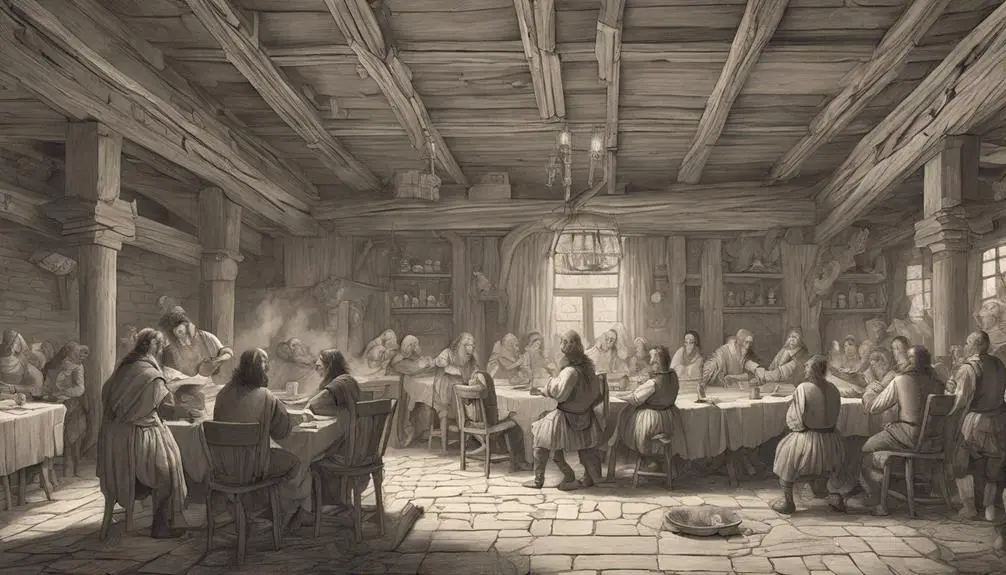
To fully grasp the biblical interpretation of carousing, you'll need to delve into the scripture's original languages and cultural context, examining how this term is used and its implications in various biblical passages. You'll find that carousing is often associated with excessive feasting, drinking, and revelry. It's a symbol of uncontrolled indulgence, often contrasting with the virtues of temperance and moderation.
Carousing symbolisms are significant. They highlight the spiritual danger of becoming too engrossed in worldly pleasures, losing sight of one's commitment to God. Its usage is a stark reminder of the potential fall from grace when one succumbs to these base desires.
The prophetic implications of carousing are also noteworthy. In the context of prophetic literature, carousing often foreshadows divine judgment. It serves as a warning – a call to repentance – before it's too late. In essence, it's a prophetic tool used to underscore the severity of straying from God's path.
Historical Context of Carousing
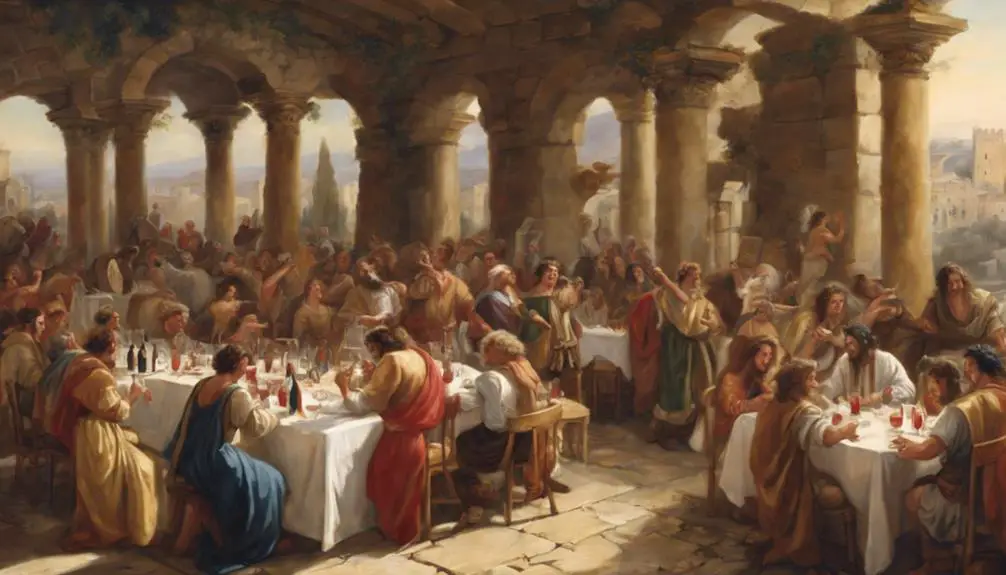
Shifting our focus from the biblical implications of carousing, let's consider its historical context, examining the societal norms and cultural attitudes towards indulgence during the time when these scriptures were written. Carousing, essentially a word for indulgence in excessive drinking and revelry, wasn't an uncommon practice in ancient societies. However, its symbolism and the perception towards it varied greatly.
In the context of ancient festivities, carousing was often a significant part of the celebration. It symbolized not only joy and merriment, but also the communal aspect of society. Feasts were lively social events, and the act of carousing was a communal affirmation of shared values and experiences. Yet, it wasn't universally accepted. Many viewed it as an act of debauchery, indicative of a lack of self-control and moral decadence.
In understanding the biblical interpretation of carousing, it's crucial to understand this dichotomy. The scriptures were written in an era where carousing wasn't merely an act of indulgence, but a symbol with varied implications, deeply intertwined with societal norms, cultural attitudes, and ancient festivities. This historical context frames our understanding of the biblical perspectives on carousing.
Carousing in New Testament Scriptures
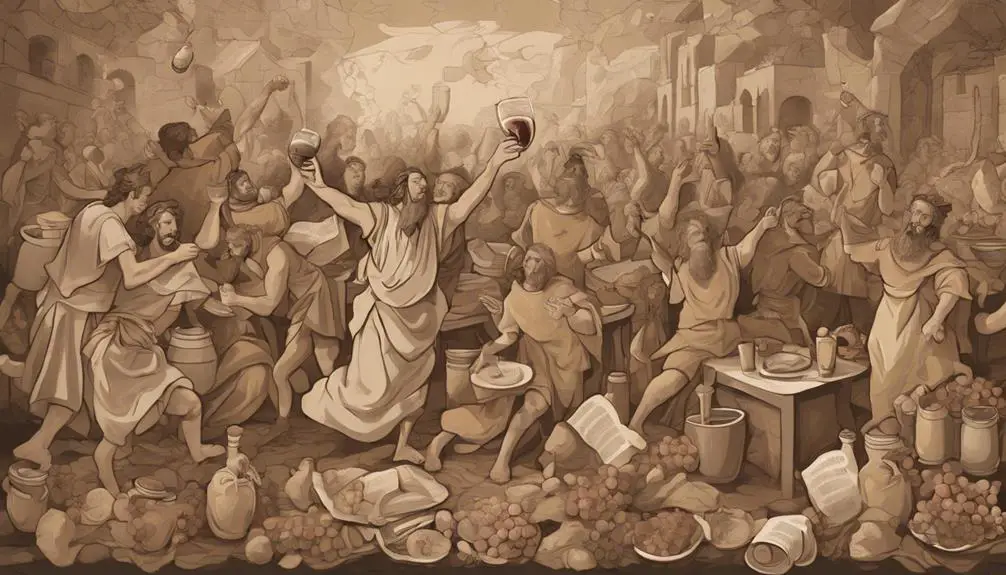
How does the New Testament, the second part of the Christian Bible, address the issue of carousing? The New Testament scriptures, in their wisdom, provide clear references to carousing and its associated symbolisms and consequences.
Carousing, often symbolized as reckless indulgence in sensual pleasures, is repeatedly warned against. It's portrayed as a way of life that's contrary to the Christian ethic of self-control and sober-mindedness.
Consider this table, illustrating some New Testament scriptures that speak to carousing:
Scripture Reference |
Carousing Symbolisms |
Carousing Consequences |
|---|---|---|
Galatians 5:21 |
Drunkenness, orgies |
Will not inherit the kingdom of God |
Romans 13:13 |
Orgies, drunkenness |
Condemnation, conflict |
1 Peter 4:3 |
Debauchery, lustful desires |
Judgement |
1 Corinthians 6:10 |
Drunkards |
Will not inherit the kingdom of God |
These verses indicate the severity of carousing's consequences. They highlight the spiritual perils that come with such behavior, including exclusion from God's kingdom and divine judgement. Hence, the New Testament's stance on carousing is clear – it's a destructive behavior that leads one away from God's path.
Lessons From Biblical Carousing Instances
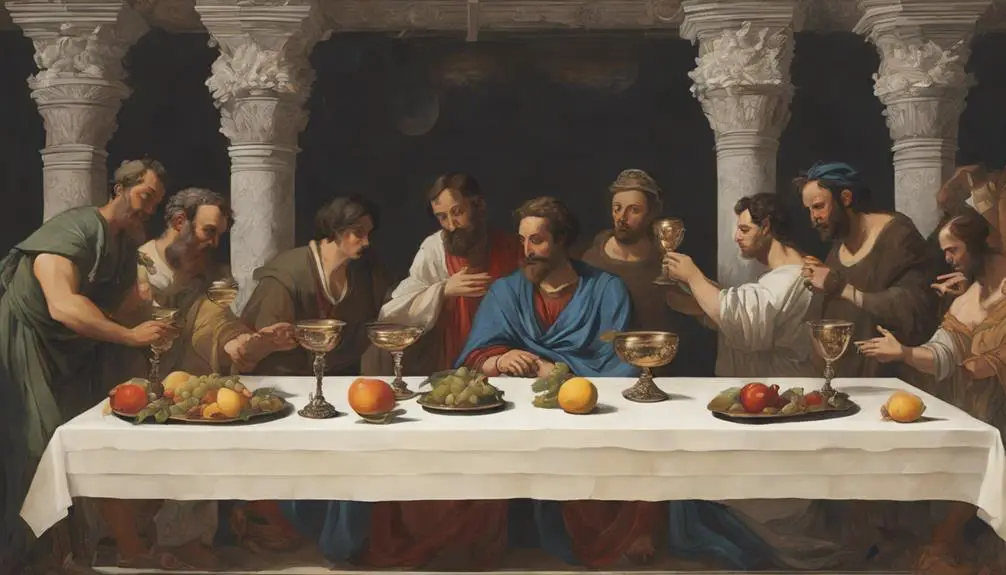
Drawing from the stern warnings against carousing in the New Testament, we can glean valuable lessons from specific instances of this behavior depicted in the Bible. Particularly, the Carousing Consequences and Moral Implications are paramount to our understanding.
An apt example is the narrative of Lot's daughters in Genesis 19. Their carousing led to incest, a grave moral violation, underscoring the moral implications of such behavior. This narrative warns you of the potential corruption of moral judgment, a consequence of carousing.
King Belshazzar's carousing in Daniel 5 resulted in divine judgment. His excessive revelry and the disrespectful use of sacred vessels led to his downfall. Here, the Bible teaches you that carousing can lead to a lack of reverence for what's holy, ultimately yielding dire consequences.
The Prodigal Son's carousing (Luke 15) led to abject poverty and disgrace. His reckless living warns you of the potential for material and personal ruin.
Examining these instances, you see that the Bible doesn't merely condemn carousing, but vividly illustrates its consequences. These lessons serve as stern warnings for you, emphasizing the Bible's stance on the moral implications of carousing.
Modern Perspectives on Biblical Carousing
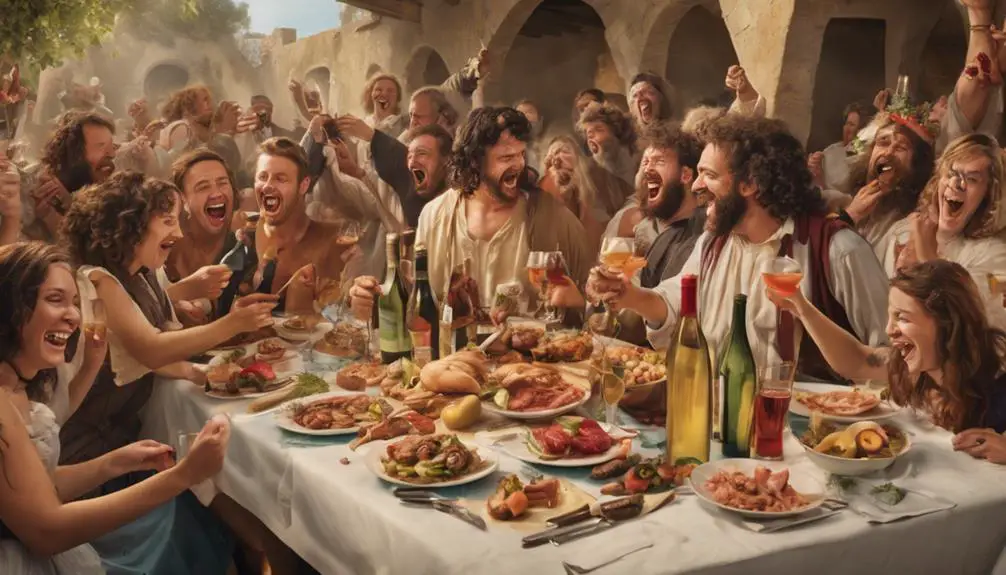
In today's society, the biblical concept of carousing often stirs varied interpretations and debates, particularly regarding its relevance and application in contemporary contexts. The concept is no longer as straightforward as it was in biblical times.
To aid your understanding, let's consider the following table:
Biblical View |
Modern Perspective |
Societal Implications |
|---|---|---|
Carousing as sinful |
Carousing as socializing |
Increased acceptability |
Physical punishment |
Carousing consequences are often psychological |
Shift in societal norms |
Direct divine intervention |
Consequences seen as natural outcomes |
Less reliance on divine punishment |
Biblically, carousing was seen as sinful, with physical punishments often meted out. Today, however, you may view carousing as a form of socializing, with the consequences often being psychological rather than physical. This shift in perspective has led to increased acceptability of carousing and a change in societal norms.
While the Bible depicted direct divine intervention as a consequence of carousing, modern perspectives tend to see the outcomes as natural consequences of one's actions, leading to a decreased reliance on the concept of divine punishment. This shift has significant societal implications, reshaping our understanding of accountability and morality.
Frequently Asked Questions
How Has the Act of Carousing Evolved Over the Centuries, Beyond the Biblical Context?
Over centuries, you've seen carousing's historical influence shape societal norms. Originally rooted in biblical context, modern carousing has evolved to signify any form of excessive indulgence in activities, often associated with drinking and partying.
While it's lost its religious connotations, it's gained a broader, more secular meaning. Yet, remember, despite its evolution, the essence of carousing remains the same – excessive indulgence that's often met with disapproval.
Are There Any Non-Christian Religious Texts That Mention or Define Carousing?
You're interested in non-Christian texts mentioning carousing.
In Buddhism, while it's not explicitly called 'carousing', teachings discourage excessive indulgence.
Hindu texts, like the 'Mahabharata', caution against excessive drinking, which could be seen as a form of carousing.
It's important to remember each religion interprets these behaviors differently, and context matters greatly.
How Does the Concept of Carousing Relate to the Biblical Idea of Sin and Forgiveness?
In the Bible, carousing often leads to sin. It's a behavior that can bear negative consequences, pushing you away from righteousness.
Yet, the beauty of the biblical teachings lies in their emphasis on forgiveness. Even if you've erred by carousing, repentance and seeking God's mercy can lead to forgiveness.
This complex relation between carousing, sin, and forgiveness is a testament to the depth of biblical interpretations.
Are There Any Scientific or Psychological Studies That Explore the Effects or Implications of Carousing?
You're asking about scientific or psychological studies on carousing's health implications and the psychological impact of carousing.
While I'm unaware of research specifically using the term 'carousing', there's extensive literature on the effects of excessive socializing and substance abuse.
Typically, these activities can lead to negative physical and mental health outcomes.
It's important, though, to delve into specific studies for a more comprehensive understanding.
What Is the Societal Perception of Carousing in Different Cultures Around the World?
You'll find that societal perceptions of carousing differ greatly around the globe. In some cultures, it's seen as a normal, even necessary, part of social interaction.
In others, carousing legislation and deterrence methods are heavily enforced to discourage such behavior. It's a complex issue, influenced by factors such as cultural norms, religious beliefs, and societal expectations.
Understanding these nuances is key to a comprehensive study of global carousing practices.
Conclusion
In conclusion, you've journeyed through the biblical interpretation of carousing, its historical context, and instances in New Testament scriptures.
You've gleaned lessons from these biblical instances and explored modern perspectives.
It's clear that carousing, often linked with debauchery and excess, is generally viewed negatively in the Bible, serving as a stark warning against indulgence and immorality.
This exploration has deepened your understanding and hopefully encouraged a thoughtful approach to biblical teachings.



Sign up